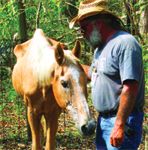HSUS eyes lead role in disaster response
National Report - The Humane Society of the United States (HSUS) plans to organize an army of veterinarians and create a central command for animal disaster relief.
NATIONAL REPORT — The Humane Society of the United States (HSUS) plans to organize an army of veterinarians and create a central command for animal disaster relief.
The $5-million initiative comes off last year's $200 billion hurricane season branded by Katrina, Rita and Wilma — storms that overwhelmed government agencies and rescuers with estimates of 50,000 to 70,000 abandoned and displaced animals. Bureaucracy within the Federal Emergency Management Agency (FEMA) and its subsidiary National Disaster Medical System (NDMS) is largely blamed for sluggish deployment and supply shortages during Katrina for the nation's four Veterinary Medical Assistance Teams (VMAT).

An HSUS volunteer visits a rescued horse that had been stranded during Hurricane Katrina.
Yet as the American Veterinary Medical Association, the parent of VMATs, works to cut red tape for government-sanctioned veterinary medical volunteers, HSUS representatives have decided to work outside the federal system.
Their goal: to unite and lead the nation's animal rescue groups in control and response.
At the helm is Dr. Barry Kellogg, disaster expert and longtime VMAT leader credited for aiding in the group's 1994 inception. Kellogg, now medical director of HSUS Disaster Services, says he's not looking to step on VMAT toes. Instead, he wants to build a force of veterinarians to bridge the gap between disaster strikes and VMAT deployment.
"If we develop this disaster services branch appropriately by making the connection between state veterinarians, VMATs and others, we can effectively cut through some delay time and effectively manage a veterinary response," he says. "We have no intention of duplicating VMATs. What we need to do is reorganize the situation so that next time, it's better handled."
AVMA caught off guard
HSUS plans, at presstime, were so new AVMA leaders were largely unaware of the group's initiative. In April, Executive Board members voted to nix a joint letter with HSUS concerning mutually supported congressional issues — a move showing conservative veterinary medicine's apprehension about linking with a humane organization that critics say operates like an activist group.
AVMA President Dr. Henry Childers, a proponent of unification, champions bonding with HSUS on common goals. Yet he was surprised by news of the humane organization's initiative, citing no word of the group's plans during the AVMA National Animal Disaster Summit held in May in Arlington, Va. The summit, which HSUS attended, gathered representatives from roughly 100 government agencies, veterinary and human groups and industry experts to recap obstacles in connection with Katrina relief efforts and brainstorm on a national disaster plan.
"We would certainly like to find out more about what HSUS is proposing," he says. "Certainly I'm not opposed to other people helping if they do an excellent job, and I don't think that AVMA has rights to keep other people out. But the reason for the summit was to give everyone an opportunity to comment on what happened and ways of improving to do a better job in the future. There was no mention of creating any HSUS veterinary rescue force. This is unexpected."
Bogged down by bureaucracy
According to Kellogg, HSUS plans weren't formulated until after the summit, which failed to produce what he'd hoped would be a central agency designed to unite the various groups in disaster control and response. In traditional AVMA fashion, a committee was formed to consider creating a coalition of agencies to guide animal emergency management issues.
"That was a big disappointment," Kellogg says. "The single piece missing in my mind is a leader to become a hub that works with all agencies to have an adequate response for animals."
While he praises VMAT work, which he led for a decade, Kellogg notes last year's hurricane season merely exposed problems that had always existed. Although AVMA financially supports VMATs, they are steered by NDMS/FEMA directives. VMATs cannot act until deployed by the federal government, which also authorizes all communication, supplies and travel for the veterinary medical teams.
"The federal government had always been a stumbling block," Kellogg recalls. "We found ourselves in Katrina, for example, with no issued supplies. Despite all the private donations, they didn't provide us with materials until 33 days into it, and VMATs weren't even deployed until three days after the devastation."
Kellogg continues to serve VMAT 1 as deputy commander.
Playing by the rules
FEMA management of Katrina's aftermath has been so widely criticized congressional hearings and investigations have spawned another storm, giving rise to calls for the agency's abolishment by a U.S. Senate committee.
Yet AVMA is attempting to patch cracks in the federal system with regard to its veterinary volunteers. While HSUS moves full steam on enacting its own relief plans, Dr. Cindy Lovern, AVMA's liaison to VMATs, works the government angle, attempting to iron out a written agreement with the Department of Homeland Security, which governs FEMA and NDMS. The document, or memorandum of understanding, describes the function and duties of VMATs within the federal disaster response program.
"From there, we want to be able to make sure there is system in place where veterinarians can be utilized and get the supplies they need," says Lovern, assistant director of the AVMA Scientific Activities Division.
Outside the system
Even if AVMA gets its memorandum signed and works out kinks within the VMAT supply chain, the efforts won't fix the government's deployment delays, Kellogg predicts. It takes days for government paperwork to catch up with natural disasters, he contends.
"I'm extremely happy with VMATs; they're a tremendous group, and we've done what we can in spite of the federal government," Kellogg says. "But I think the federal government is paralyzed at this point in its ability to respond. I've cut a tremendous number of levels of bureaucracy by joining HSUS. We plan to make things a lot better for animals in times of disasters."